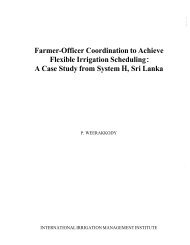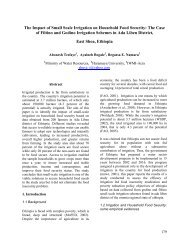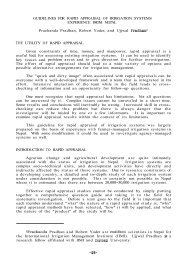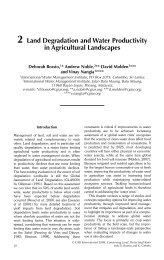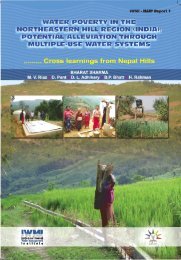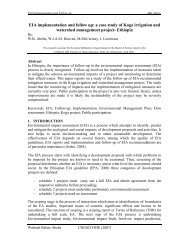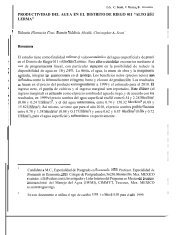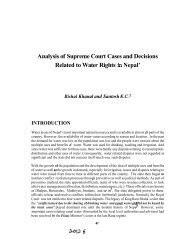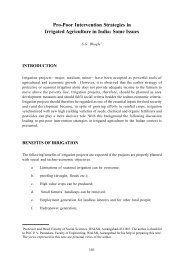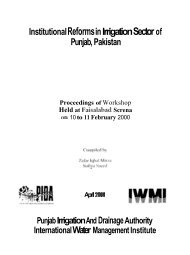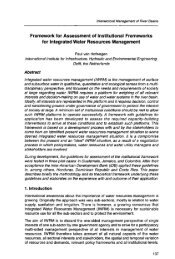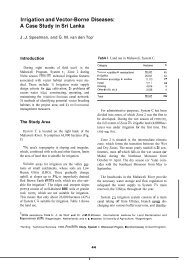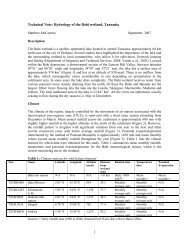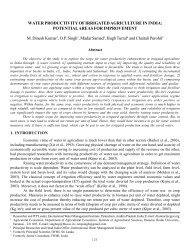INSTITUTION BUILDING AND RURAL DEVELOPMENT IN NEPAL ...
INSTITUTION BUILDING AND RURAL DEVELOPMENT IN NEPAL ...
INSTITUTION BUILDING AND RURAL DEVELOPMENT IN NEPAL ...
You also want an ePaper? Increase the reach of your titles
YUMPU automatically turns print PDFs into web optimized ePapers that Google loves.
The death of the sole owner, the fragmentation of the estate, and the new<br />
laws stripping the Ranas of their power caused anarchy in the area. People<br />
tried to encroach upon the estate from all sides and take as much of the<br />
horticultural property as they could. A Newar businessman who was a pradhan<br />
pancha, and a Brahmin pancha took the opportunity to convince the heirs to<br />
the estate to dispose of their part of the estate. The Newar managed to pool<br />
enough resources from several buyers to purchas.? a major portion of the estate<br />
for himself. Then he cleared the hcdicultural resources for commercial gain,<br />
and resold the estate in plots to those buyers from whom he had already<br />
collected money. These buyers were predominantly Brahmins and Chhetris.<br />
The Brahmin pancha purchased part of the estate directly from one of the<br />
deceased owner’s sons. Thus, the estate was populated by Brahmins and<br />
Chhetris, who filled the socioeconomic vacuum left by the Ranas. The Rais did<br />
not gain at all from the changeover.<br />
-~<br />
The Rais’ point of view. The Rais felt that the irrigation project was for<br />
the benefit of the elite group living in the head unit of the command, In 1979<br />
they opposed the project as they felt that what was a communal river and<br />
supply of water would become tied up in a system that excluded them.<br />
The way the project developed in its initial years (1979-81) only<br />
strengthened the Rai’s notion that it was to serve the local elite. .4 farmer<br />
was deprived of his water mill upstream because it was using water from the<br />
Likhu River. The farmer also lost part of his land to the canal. He has not<br />
yet received compensation.<br />
The Rais noted that in the first two years of the project’s phased water<br />
delivery, most of those who practiced irrigated agriculture were head unit, high<br />
caste people. Rais were pressured into selling good pieces of land that were<br />
favorably located in terms of the irrigation network. The buyers were quick to<br />
anticipate an increase in the value and agricultural productivity of the land. It<br />
has been estimated that the Rais lost over 10 percent of their land to high<br />
caste immigrants.<br />
The committee chairman, who was an immigrant himself, seemed reluctant<br />
to open cases of illegitimate water diversion by his committee colleagues for<br />
public hearing, or to punish the guilty. The committee’s failure to punish its<br />
own errant members affected its legitimacy. The head unit farmers enjoyed<br />
license to tamper with the canal anywhere and take the quantity of water they<br />
wished, whereas it was difficult for the middle and tail unit Rais to get the<br />
water they needed. The situation divided the farmers both at the command<br />
level and at the committee level. Many members began to feel that the<br />
chairman and vice-chairman were siding with the high castes and bullying the<br />
lower ones.<br />
Irrigation officials did not contribute to harmony and equity. The<br />
engineer would informally allow high caste influential farmers to open new<br />
outlets unilaterally. The overseer was responsible to the engineer and to the<br />
committee. He did not have the power to correct or punish violations of the<br />
distribution system, and it was impractical for him to antagonize the<br />
committee’s influential high caste pancha leaders.<br />
The relationship between the committee and the water users often<br />
rendered committee decisions on water allocation and enforcement of sanctions<br />
against rule violators redundant. The committee was not able to bring its<br />
-49-



